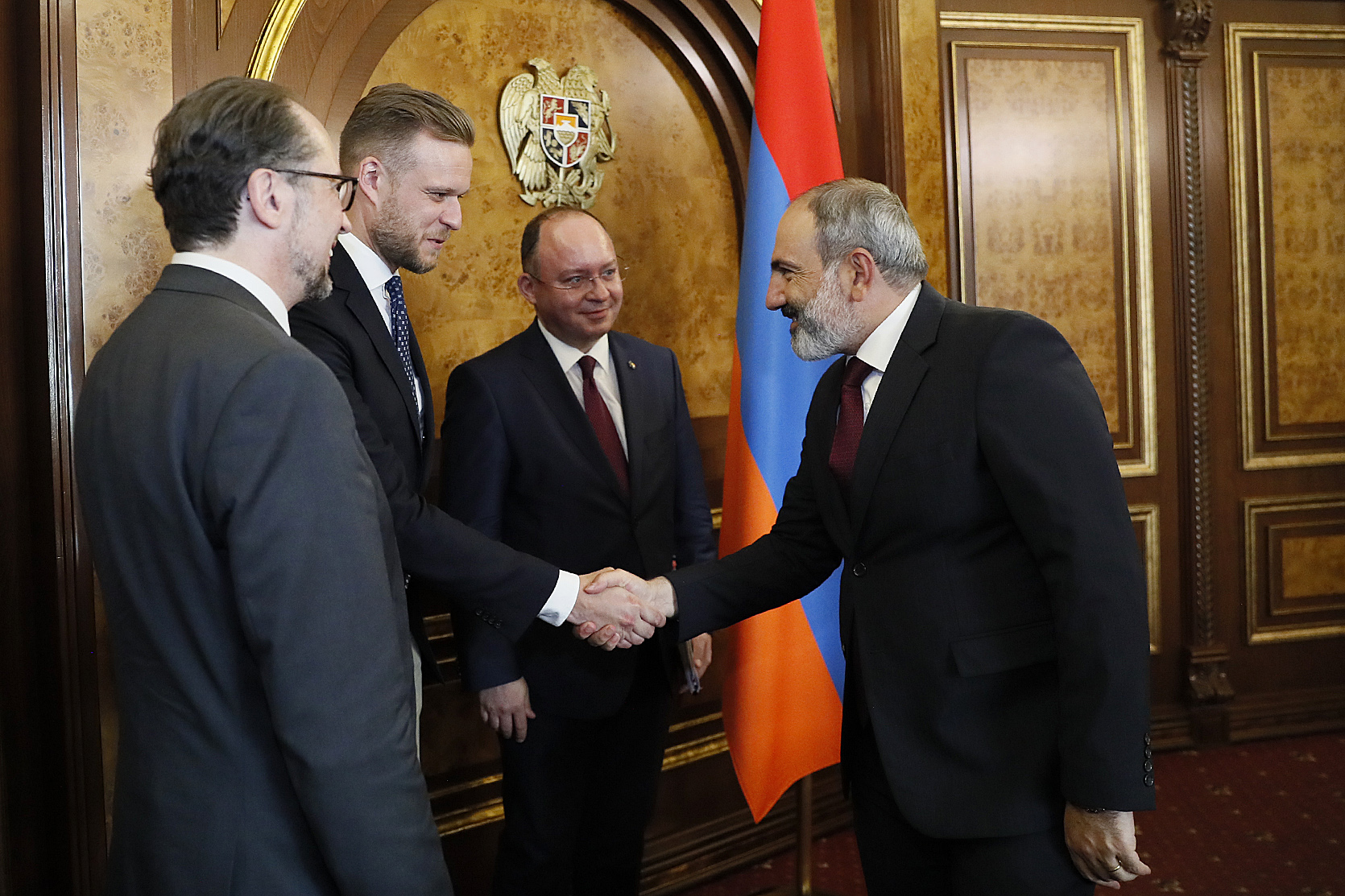Acting Prime Minister Nikol Pashinyan received Romanian Foreign Minister Bogdan Aurescu, Lithuanian Foreign Minister Gabrielius Landsbergis, Austrian Federal Minister for European and International Affairs Alexander Schallenberg, as well as EU Foreign Policy Service Managing Director for Russia, Eastern partnership, Central Asia, Regional cooperation and OSCE Michael Siebert and EU Special Representative for the South Caucasus and the Crisis in Georgia Toivo Klaar. The visit was mandated by EU High Representative for Foreign Affairs and Security Policy Josep Borrell.
Nikol Pashinyan appreciated the visit paid by such a representative EU delegation to our country, noting that it was planned at a time when there were more crises than solutions in Armenia. “I am glad that the visit comes in the wake of parliamentary elections, which reaffirmed our people’s adherence to democratic values and the quality of which was highly appreciated by international organizations,” Armenia’s Acting Prime Minister said, adding that the political crisis in Armenia is over, and the Government can resume the implementation of its primary agenda, including the effective implementation of the provisions stipulated in the EU-Armenia Comprehensive and Enhanced Partnership Agreement (CEPA).
Romanian Foreign Minister Bogdan Aurescu said it was the first ever regional visit of such an important delegation, which seeks to stimulate EU-Armenia relations. The Romanian Foreign Minister complimented Nikol Pashinyan for holding high-standard elections and on the victory of his Civil Contract party, as well as on CEPA’s entry into force on March 1 this year. He stressed the need for Armenia to get the most out of the aforementioned agreement and reaffirmed the European Union’s readiness to help the Armenian government with the ongoing institutional reforms.
Lithuanian Foreign Minister Gabrielius Landsbergis highlighted the strengthening of security and stability in the South Caucasus, noting that this is of paramount importance in terms of building security in general. The Lithuanian Foreign Minister stressed the need to create and foster an atmosphere of trust between the parties to the Nagorno-Karabakh conflict, adding that the EU is ready to assist in this matter as well. Gabrielius Landsbergis stressed the importance of humanitarian issues, including the repatriation of Armenian prisoners of war held in Azerbaijan.
Touching upon the results of the snap elections held in Armenia, Austrian Federal Minister for European and International Affairs Alexander Schallenberg noted that democracy was the primary winner in those elections. In his words, those who predicted challenges and flaws in Armenia’s elections were wrong to the joy of the Armenian people, which testifies to Armenia’s adherence to democratic values.
Thankful for the kind remarks and opinions voiced by the guests, Nikol Pashinyan emphasized that the crisis that developed after the war, as well as the elections, showed the viability of democracy in our country, which means that democracy is irreversible in Armenia.
During the meeting, the interlocutors discussed the agenda of EU-Armenia relations, as well as issues related to the regional situation. Nikol Pashinyan highly appreciated the role played by the EU, and in particular, by President of the European Council Charles Michel in facilitating the return of 15 Armenian prisoners of war from Azerbaijan, noting that Armenia is prepared to respond with a similar step.
The Acting Prime Minister stressed the need for full implementation of the trilateral agreement signed by Azerbaijan on November 9, 2020, the unconditional return of all prisoners of war, as well as the peaceful resolution of the situation on the Armenian-Azerbaijani border. Nikol Pashinyan said he saw the settlement exclusively in the withdrawal of Azerbaijani troops from Armenia’s sovereign territory to their original positions, and recalled that he had previously made a proposal to that effect.
With reference to the Nagorno-Karabakh conflict, Nikol Pashinyan emphasized that the comprehensive settlement of the conflict should be negotiated under the auspices of the OSCE Minsk Group.















